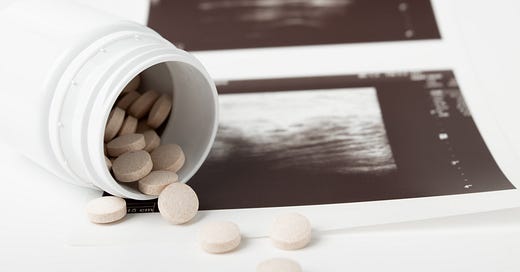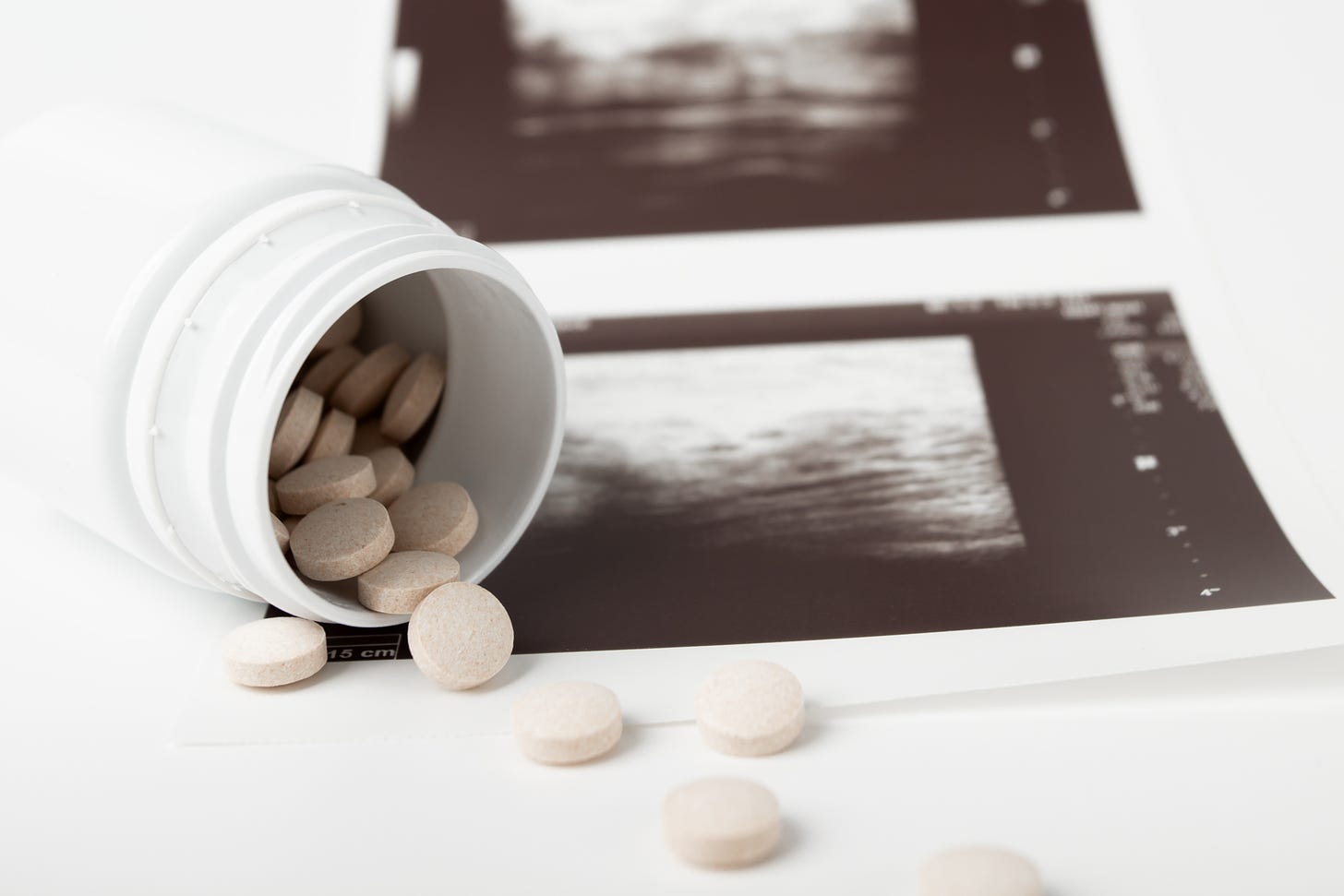
The New War on Drugs
Criminalization of abortion medication turns women’s bodies into crime scenes
Karen Thompson is the Director of Litigation at Pregnancy Justice, where she leads a team of attorneys in defending women and all those with the capacity to become pregnant from being criminalized because of their pregnancies or pregnancy outcomes.
Earlier this year Louisiana Governor Jeff Landry signed into law SB 276, a first-of-its-kind legislation classifying mifepristone and misoprostol as controlled dangerous substances. The drugs, commonly used to perform medication abortions, are responsible for 63% of abortions in the US. As a result of this new law, mere possession of mifepristone and misoprostol without a prescription in Louisiana can result in fines of up to $5,000 or “imprisonment of no more than five years with or without hard labor.”
We know what happens now: The outcome of this new layer of criminalization is entirely foreseeable. By putting the pills on a drug registry with special access rules, providers are no longer able to easily prescribe the pills and the ability of OB/GYNs to nimbly provide needed—and even emergency—health care if a woman is miscarrying is chilled. In Louisiana’s telling, mife and miso are the new heroin and medication abortion care puts pregnant people’s lives in jeopardy, not their own dangerous law. The lack of situational awareness around the law would be comical if the inevitable devastation of its effects wasn’t so horrifying.
This is true even for people who are not using the drugs to end their pregnancies, but for the myriad other health issues the drugs treat—from softening the cervix for an endometrial biopsy to the insertion of IUDs. But the massive burden SB 276 places on pregnant people—particularly those seeking to self-manage their own abortions—is disastrous. By reclassifying a safe, effective, regulated drug used for a broad range of healthcare purposes into a dangerous controlled substance whose distribution and use can be entered and tracked in a state database, Louisiana, as one local health care provider noted, would “effectively be creating a database of every woman who is prescribed mifepristone and misoprostol, regardless of the reason, truly monitoring women and their pregnancies. That should be unimaginable in America.”
Such policing is not only very much imaginable in America, but has been the country’s sad truth for decades. Before the overturning of Roe v. Wade, state surveillance and criminalization of women during pregnancy and around their pregnancy outcomes—based on their alleged drug use, in particular—was the daily truth for countless women and other people who can become pregnant. A past truth is simply devolving into a dystopian present.
To be clear, classifying drugs in light of their potential harms is not a new thing. One of the most infamous classification tools, the Controlled Substances Act, has been in place since the 1970s, when President Nixon signed it into law. The CSA became the enforcing mechanism for Nixon’s “War on Drugs,” and gave both the Drug Enforcement Administration and the Food and Drug Administration power to determine which substances were fit for medical use. Such regulation can serve a useful purpose; the CSA is itself the legislative grandchild of the Pure Food and Drug Act of 1906, which required food and drug manufacturers to clearly label any product that contained dangerous substances, including morphine and opium, drugs often included in everyday products from soft drinks to teething medicines.
But SB 276 is not trying to protect babies. As John Erhlichman, one of Richard Nixon’s Watergate co-conspirators, bluntly stated in 1994: “[w]e knew we couldn’t make it illegal to be either against the [Vietnam] war or blacks, but by getting the public to associate the hippies with marijuana and blacks with heroin, and then criminalizing both heavily, we could disrupt those communities. We could . . . vilify them night after night on the evening news. Did we know we were lying about the drugs? Of course we did.”
Once again, government actors are lying about drugs to criminalize women’s access to and control over their own social and bodily autonomy. Louisiana’s law unmasks in broad daylight what so many people and communities living with the consequences of bad drug policy have long known: the “war on drugs” is a political invention to construct fiscal and social power over individuals and communities, not to provide much needed public health services.
By placing mife and miso on the controlled substances list, pregnant people are put in the horrible position of having to choose between relying on their family, friends, and providers—or isolating themselves from them out of fear of exposing their loved ones and healthcare providers to criminal penalties. What better way to force the expansion of the war on drugs than by making women’s bodies walking crime scenes subject to State oversight?
Making medical abortion pills controlled substances will only place more government tentacles into ever expanding areas of women’s lives, pregnancies, and bodily autonomy.
And while Louisiana claims to “allow” pregnant women to use the medication when prescribed for other health purposes, the utility of that so-called exception is belied by actual realities on the ground: Nearly 10 years ago, a 23-year old woman was charged with murder in Georgia after a county social services worker reported her to police for taking medication abortion pills, even though the pills were not illegal to use. While she was later released from jail on the murder charge, she still faced a misdemeanor charge of possession of a dangerous drug. Same tune, different lyrics, but we have been here before, we know what happens, and we know who it happens to.
The fact is, women are and will be criminalized for anything related to their pregnancy—whether or not they have done anything illegal. More than half of the states have laws that require reporting people’s use of drugs during pregnancy, and/or define drug use during pregnancy as civil child abuse or neglect. And these cases have been ramping up at an alarming rate. As Pregnancy Justice found in its two decades of research, instances of pregnancy criminalization went from 413 reported cases between 1973 and 2005 to 1,396 cases between 2006 and the overturning of Roe.
Put another way, pregnancy criminalization cases have tripled in half the time. And those are the cases we know about. Louisiana’s placement of abortion medication on controlled substances lists only helps put the slip in the criminalization slope.
Right now, in the fifth decade of the war on drugs, this law and these prosecutions will dramatically escalate the already-soaring rates of women’s convictions and incarcerations, which are nearly double the rate of men. Most detained women are held pre-trial in state jails, and of the millions incarcerated each year, 3% of all women entering state prisons and local jails are pregnant.
By criminalizing possession of abortion medication, the Venn diagram of overlap between the “war on drugs” and the war on reproductive freedom has, once again, become a perfect circle. The efforts to control reproduction and drugs are rooted in the same forms of bigotry: controlling women’s behavior and liberties rather than providing actionable solutions to satisfy public health needs.
Louisiana’s law creates new harms with the same old, tired, tools.
Can you feel your hair turning gray just reading this? Does it make you angry? You should be. So are we. Learn more about what you can do and what organizations like Pregnancy Justice are doing to speak out and act. Or, donate today so organizations like Pregnancy Justice can continue our nationwide fight against the criminalization of pregnant women and all folks who can be pregnant.

















Can a state criminalize the use of a drug that has FDA approval? (Forgive the naïveté of this question…) or will this bill be immediately challenged in federal court?
The federal Centers for Disease Control has a contraception app for health care providers to use when discussing contraception with patients. It includes more than 60 characteristics or medical conditions for consideration as well as many clinical situations. The app can be downloaded from the Apple App Stoire or Google Play. See https://www.cdc.gov/contraception/hcp/contraceptive-guidance/app.html.
On August 6, 2024, the CDC updated the U.S. Medical Eligibility Criteria for Contraceptive Use, 2024, specifying contraceptive methods suitable for people based on characteristics or medical conditions (e.g., kidney diseaes, postabortion, lupus, sickle cell disease, etc: https://www.cdc.gov/contraception/hcp/usmec/. The full study is available at https://www.cdc.gov/mmwr/volumes/73/rr/rr7304a.1.htm.
Jesa Marie Calaor's "27 IUD Experiences that Prove We Need Better Birth Control Now," ALlur (Aug. 12, 2024), https://www.allure.com/story/iud-side-effects-benefits-experiences points out that, although IUDs are hioghly effective in preventing pregnancy, IUD users' experiences with insertion and use of an IUD vary greatly. A Cornell University study found that 78% of survey respondents experienced moderate to severe plain when an IUD is inserted. Not only the type of IUD but the health caer provider's skill and experience affect how painful the insertion is.